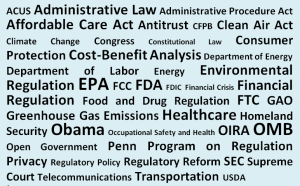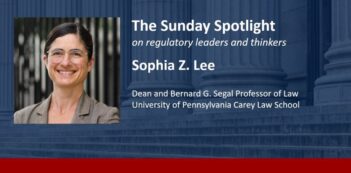
In commemoration of RegBlog’s fifth anniversary, experts look back on the last five years of regulation before looking forward to the next.
This month marks the fifth anniversary of the launch of RegBlog, the daily publication affiliated with the Penn Program on Regulation.
During the last five years, RegBlog has featured new content every weekday, in the process establishing for itself a reputation for fluency in complex regulatory issues and an ability to break these issues down in a nuanced yet accessible manner for the general reader. RegBlog covers some of the most vital issues of our day, doing so in a way that brings value both to influential professionals as well as to students and members of the public. No other publication is quite like it.
Much has happened in the regulatory world within the past five years, and RegBlog has been there for it all. Its coverage has swept across every area of the regulatory arena, each essay stamped with RegBlog’s distinctive brand of incisive, clear, and engaging writing. It has covered virtually every major government agency, from the Administrative Conference of the United States (ACUS) to the U.S. Department of Agriculture (USDA).
A word map of the most frequent topics featured on RegBlog shows the sheer breadth of its coverage. RegBlog has featured news, analysis, and commentary running the full gamut of regulatory issues, from healthcare, to the environment, to financial regulation, to telecommunications. And these are only RegBlog’s most frequently covered subject areas. RegBlog has also covered highly specialized issues, such as the debate over the “incorporation by reference” of private standards into public regulation. And in the last two years, RegBlog has added a new focus on emerging issues, such as regulation of the sharing economy.
 All of these issues have been covered through the lens of hundreds of diverse and distinctive voices. RegBlog’s contributors have included more than 130 staff writers, as well as more than 200 of the world’s leading regulatory experts, including scholars, judges, regulators, and legal practitioners.
All of these issues have been covered through the lens of hundreds of diverse and distinctive voices. RegBlog’s contributors have included more than 130 staff writers, as well as more than 200 of the world’s leading regulatory experts, including scholars, judges, regulators, and legal practitioners.
Given all that RegBlog has covered, we could not think of a better way to celebrate our fifth anniversary than by running this series of contributions from leading experts reflecting on these last five years in regulation. The overwhelming response that we received when we solicited contributions to this special anniversary series was a testament to all that RegBlog has achieved We are pleased to be running this anniversary series.
This series begins, quite fittingly, with an essay authored by the person with whom RegBlog began: the person who founded RegBlog, writing about regulatory issues on a fledgling blog he unassumingly started over five years ago (when blogs were just barely in vogue), and who, since that time, in conjunction with dozens of student-editors and writers, has built, expanded, and fortified RegBlog into the premier regulatory publication that it is today—doing so with an unparalleled passion, tirelessness, and commitment to this remarkable venture every step of the way. This individual, Cary Coglianese—the director of the Penn Program on Regulation and RegBlog’s faculty advisor—kicks off the series with a piece that reflects on RegBlog’s trajectory over the past five years.
Following Professor Coglianese’s introduction, we are honored to present essays on topics as varied as the emergence of a trans-Atlantic regulatory partnership, campaign finance regulation, and efforts to improve the estimation of health and longevity in regulatory analyses.
To close out this celebration, the fourth and final week will feature essays from experts who recently spoke on a special panel at Penn about the future of the regulatory landscape, as part of an event commemorating RegBlog’s fifth anniversary. It is during this week that we turn our gaze forward, looking ahead to the next five years in regulation.
And, as we look ahead, we are filled with growing excitement about the possibilities that are in store—both for RegBlog, and for the course of regulation more broadly. What the future holds, exactly, may not be entirely clear. Yet it is in this environment of uncertainty that RegBlog thrives, always developing and innovating in tandem with the ever-changing regulatory landscape.
But one thing is for certain: we will be here. As we have striven to do throughout the last five years, we will continue to provide our growing, worldwide audience with high-quality regulatory coverage on our site a daily basis. And we will continue to keep pace with the Digital Age, delivering a daily stream of content on our Twitter and Facebook platforms. With five years behind us, we are yet again entering a new chapter—a chapter that we hope that you, whether a new reader or one of our faithful followers, will embark on with us.
Seasons of Regulation
April 18, 2016 | Cary Coglianese
RegBlog is about a simple idea: make the all-too-hidden world of regulation more accessible and understandable to the people directly affected by it. In the process, RegBlog also provides a vehicle for the students who produce it to learn about specialized topics in regulation as well as hone their professional skills. I can hardly wait to see the rest of RegBlog‘s second act.
Are We Making Progress in Valuing Health and Longevity in Regulatory Analysis?
April 19, 2016 | Lisa A. Robinson and James K. Hammitt
The value per statistical life, or VSL, represents an individual’s willingness to trade off spending on risk reductions against spending on all the other things she could use that money to buy. These values dominate the benefit estimates for many regulations. Standardization of VSLs across federal agencies would result in more comparable analytic results, allowing decision-makers to distinguish more clearly the differences in regulatory impacts.
Campaign Finance’s Creeping Deregulation
April 20, 2016 | Richard L. Hasen
The rules regulating money in federal elections have become increasingly loosened due to court rulings, bureaucratic shortcomings, political gridlock, and aggressive election lawyers. The result is that spending unlimited and undisclosed sums to influence our federal elections has become child’s play. Given the deregulatory path campaign finance is on, even a new, more liberal Supreme Court majority would do little to fix the problems.
Stress Tests and the End of Bank Supervision
April 21, 2016 | Peter Conti-Brown
The past five years in the field of financial regulation have been nothing short of a revolution. Before the 2008 financial crisis, the line between “bank regulation” and “bank supervision” was relatively easy to summarize. But the subsequent legislative and regulatory response changed this basic design with the advent of the “stress tests,” required by the Dodd-Frank Wall Street Reform and Consumer Protection Act.
Courts Regulating the Regulators
April 25, 2016 | Christopher J. Walker
The last five years have seen a deepening criticism of Chevron and Auer—the doctrines establishing judicial deference to agency interpretation—culminating in recent congressional hearings on legislation that would instruct courts to accord no deference at all to agencies. If these developments are any indication, Chevron and Auer deference will continue to be curbed, with potentially significant implications for agencies and the judiciary alike.
A Paradigm Shift in the Cost-Benefit State
April 26, 2016 | John D. Graham and Paul R. Noe
Most statutes are silent or ambiguous on cost-benefit balancing, posing a challenge for agencies that, in the face of a longstanding judicial presumption against it, have been directed by the president to implement regulatory standards based on such balancing. But the Court’s 2009 decision, Entergy Corp. v. Riverkeeper, may have reversed that presumption, presenting an opportunity for the next President to advance the cost-benefit state.
Corruption and Government
April 27, 2016 | Susan Rose-Ackerman
Corruption in government has persisted around the world, vexing many efforts to limit its reach. Although some corruption cases are purely criminal matters where “bad actors” take advantage of opportunities for private gain, long-term solutions must go beyond the criminal law and incorporate administrative and institutional reforms. Administrative law principles of transparency, public input, and official feedback to citizens are the foundation of anti-corruption efforts.
NRC Staff Push Agency to Address Escalating Safety Concerns
April 28, 2016 | Christina E. Simeone
Seven staff engineers from the U.S. Nuclear Regulatory Commission recently filed a petition with the agency raising significant safety concerns about open phase conditions in the U.S. nuclear power plant fleet. The staff petition cites thirteen open phase events that have occurred both in the U.S. and abroad in the past fourteen years. NRC confirmed that only one plant exists without the design flaw.
The Misguided Manifesto of Regulatory Reform
May 2, 2016 | John Walke
Buried in the House Republican budget resolution is a coded manifesto for conservative political and corporate attacks on federal regulation. Over 20 “policy statements” summarize the features of recent Republican legislation targeting federal safeguards, the rulemaking process, law enforcement, and federal administrative law. These policies signify an attempted upheaval and dismantling of a regulatory system that has long protected many areas of life.
We Are All Publicists Now
May 3, 2016 | Michael Herz
There are currently an estimated 10,000 federal government social media accounts across dozens of different platforms. However, agencies are prohibited from using appropriations for publicity or propaganda purposes. As government continues to interact with the public online, agencies and officials will continue to curate their social media accounts to best reach the public, and the effect of this newfound publicity will continue to be debated.
The Potential Emergence of a Transatlantic Regulatory Partnership
May 4, 2016 | Richard W. Parker
Few regulatory developments over the past five years hold greater potential significance than the United States and European Union’s February 2013 decision to begin negotiating a regulatory partnership as part of the Transatlantic Trade and Investment Partnership. How should negotiators undertake designing a transnational administrative process for U.S.-EU regulatory cooperation over the long term?
The Student Side of RegBlog
May 5, 2016 | Jonathan Mincer
For five years, Penn Law students have contributed to a daily publication focused on the important legal issues at the forefront of our nation’s regulatory landscape. RegBlog, a student-run online source of regulatory news and analysis, has provided students with an invaluable opportunity to learn about a variety of topics while developing important professional skills that will prepare them for the challenges of legal practice.
What Will the Regulatory Landscape Look Like in 2021?
May 9, 2016 | Sam Batkins
What will the next five years in regulation hold? No matter who wins the White House, there will be more acrimony, legal and political battles, and debate about the Office of Information and Regulatory Affairs. If a Republican is elected, expect slightly fewer major rules. If a Democrat wins, expect current trends to continue. Regardless, those hoping for a sea change in the regulatory landscape should expect disappointment.
We Need to Get Back to Work
May 10, 2016 | Rena Steinzor
In order to frame my predictions of the administrative state, I have decided to channel Democratic presidential candidate Bernie Sanders. If I were advising Sanders on the administrative state’s revival, I would urge him to accomplish significant action on climate change, adopt practices designed to maintain the administrative state’s stability, fund regulators adequately, and grapple with the challenges that statutes authorizing agency action barely address.
Building More Effective Regulation
May 11, 2016 | Andy Green
Markets need structure and policing. The idea that there can be a “free” market is a myth. For markets to exist, laws and property rights are needed. Without good regulation, financial interests can tend to act in a narrow sense of their own self-interest, taking advantage of ordinary folks and small businesses but ultimately undermining the market’s stability. We know that from the financial crisis.
A Forecast of the Next Five Years in Regulation
May 12, 2016 | Sara Bodnar
To celebrate its Fifth Anniversary Series, RegBlog hosted a diverse panel of experts to look ahead at the next five years of regulation. Panelists were asked to identify the nation’s regulatory priorities, which sparked a lively debate about where regulators should best focus their future efforts: on greater implementation of cost-benefit analysis, increasing transparency, promulgating more rules, or doing a retrospective review of current rules.



